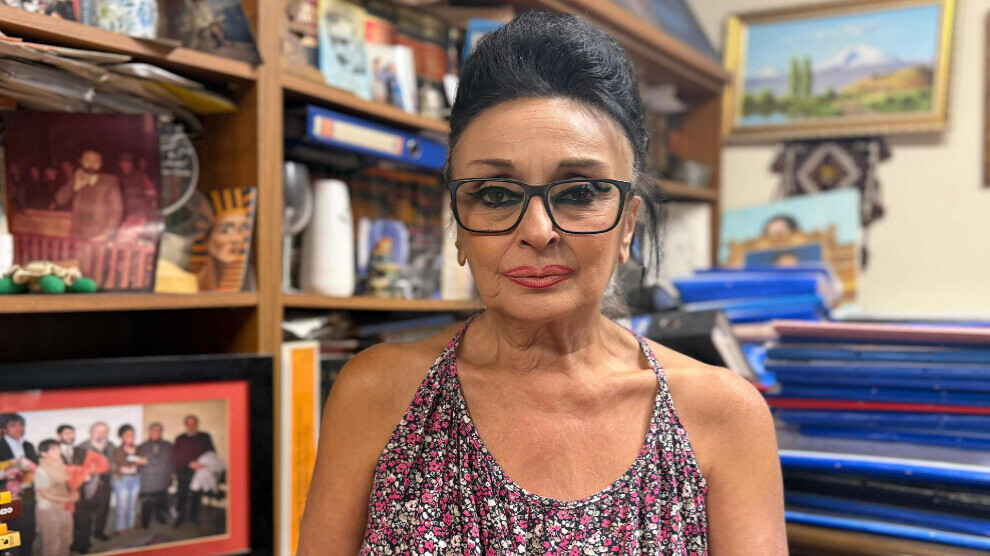Eren Keskin: The right to hope is not a privilege, it is a necessity
Lawyer Eren Keskin emphasized that the right to hope is not a privilege but a necessity.Stating that the regulation could be implemented quickly, Eren Keskin said that the right should be applied not only for Abdullah Öcalan but for all prisoners serving.

ELİF AKGÜL
Istanbul – The right to hope advocates that individuals sentenced to aggravated life imprisonment should have the possibility of release after a certain period or at least the hope of living under more humane conditions. The European Court of Human Rights (ECHR) considers it torture for individuals to live with the feeling that they will never be free while in prison. The Committee of Ministers of the Council of Europe, in line with ECHR rulings, requested Turkey to implement a regulation on the “right to hope”; within this framework, the Committee had given Turkey a one-year period in September 2024, which was set to expire in September 2025. In an interim decision made at the Committee's meeting on September 17–18, 2025, Turkey was asked to provide information on the steps taken and progress achieved regarding the implementation of ECHR judgments by the end of June 2026. In its decision, the Committee explicitly stated that it expects the implementation of ECHR judgments concerning prisoners who could benefit from the right to hope, primarily Kurdish People’s Leader Abdullah Öcalan. In Turkey, especially human rights defenders emphasize that this is critical for the democratic resolution of the Kurdish issue. With the topic being raised by MHP Chairman Devlet Bahçeli as well, the right to hope has been openly discussed for the first time by actors within the state.
‘The right to hope can be regulated in an hour’
Eren Keskin, Co-Chair of the Human Rights Association and a lawyer, emphasized that the ECHR rulings on the right to hope are clear and that Turkey should not delay implementing a regulation on this matter. Lawyer Eren Keskin stated, “The right to hope, for states that have accepted the European Convention on Human Rights and recognized the binding nature of the ECHR rulings, is not a privilege but a necessity,” noting that the time given to Turkey is unnecessarily long. According to Keskin, Turkey could make a legal amendment with a “small touch” based on existing ECHR rulings, which is a very simple procedure, and prolonging the process for so long only shatters hopes. Reminding of the ECHR’s fundamental approach, Keskin said, “There are many court rulings. There is the Öcalan ruling, as well as other rulings. The ECHR essentially considers it torture for people to live with the feeling that they may never leave prison. That’s exactly what the right to hope is about. The decision was made to ensure that people have hope for life in the future, even while in prison.”
The right to hope and the democratic solution to the Kurdish issue
Lawyer Eren Keskin stated that the process regarding the right to hope is directly connected not only to internal dynamics but also to developments in foreign policy. Keskin said, “This new process is influenced by external dynamics. It has started under the influence of the situation in Syria, the Kurdish presence in Rojava, the power of the Kurds there, the reality of the U.S. and Israel, and Israel’s reckless aggression,” adding that prolonging the process harms human rights. Criticizing the Council of Europe, Keskin said, “Contrary to the Council, during such a process, Turkey could have been given not a long period, but perhaps one or two months. Giving such a long period essentially means prolonging the process, even breaking hopes to some extent.” Lawyer Keskin emphasized that “the primary actor on the Kurdish side is Abdullah Öcalan, which gives the right to hope particular significance.” According to him, the right to hope is also one of the key points for resolving the Kurdish issue.
‘Other prisoners in this region should also benefit from the right to hope’
Eren Keskin stated that the right to hope should not be applied only to Kurdish People’s Leader Abdullah Öcalan but also to all prisoners serving aggravated life sentences and sick inmates. Keskin said, “We naturally discuss the right to hope primarily through Abdullah Öcalan, because he is the primary actor on the Kurdish side in this process.” He added, “Compared to past processes, this one has a positive aspect: the MHP also supports this process. In previous periods, the MHP was opposed and pursued policies against it, but now it is included.” Highlighting that AKP and MHP have also made statements toward socializing peace, Keskin emphasized that the right to hope is a step in this direction.
‘Sick prisoners should not be kept waiting’
Focusing on sick prisoners in prison, Eren Keskin stated that the public has frequently asked about this issue during events held in many cities throughout September as part of World Peace Day. “Every week I go to a different city, attend a panel. The topic is always peace, and everyone there asks the same question: “What is happening? When will we see something? he conveyed the public’s expectation. Criticizing the delay in regulating matters concerning sick prisoners until October as “very absurd, very inhumane,” Keskin illustrated the violations experienced by sick inmates with examples. “Today, for instance, we visited our female friend Hatice Onaran in Gebze Prison. Hatice is imprisoned for financing terrorism because she deposited 200–500 lira for a few poor prisoners in prison. She deposits money into the prison account under her own identity, and people are imprisoned, and this woman is a sick prisoner,” he highlighted the existing injustices. Emphasizing that human rights defenders’ expectations are very clear, Keskin reiterated his call: “I hope the steps that will create this trust are taken as soon as possible.”
